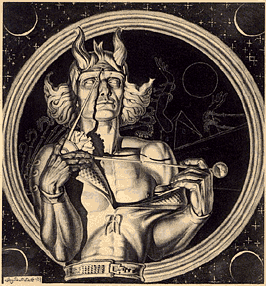
ANTI–COPERNICAN REVOLUTION
TWENTY–FIRST CENTURY AMERICAN IDEALISM
Christopher Richard Wade Dettling (2019)
Kant inaugurated a Copernican revolution in philosophy, which claimed that the subject doing the knowing constitutes, to a considerable extent, the object; i.e., that knowledge is in part constituted by a priori or transcendental factors (contributed by the mind itself), which the mind imposes upon the data of experience. Far from being a description of an external reality, knowledge is, to Kant, the product of the knowing subject. When the data are those of sense experience, the transcendental (mental) apparatus constitutes man’s experience or his science, or makes it to be such. H.J. de Vleeschauwer¹
Immanuel Kant produced the most raciological [racialist and racist] thought of the eighteenth century. Earl W. Count²
Today our academia’s influence is inexorably marginalized by the powerful political and economic movement of Americanism, unchained by the Digital Revolution, and the new computational and technological conjuncture: The Copernican Revolution cannot escape from the corrosive forces of rational political and economic order, in the rise of Global civilization, as the supremacy of American Liberty.
The Digital Revolution unchained, in the first decade of the twenty–first century, a worldwide intellectual upheaval, — the anti–Copernican revolution: The most closely guarded secrets of our government run schools and universities were quickly uncovered before the eyes of the world, the most groundbreaking being the secret of Kant and Hegel. The great academic upheaval in philosophy that shook our twentieth–century academic temples to the ground, was first unleashed by the twenty–first century Digital Revolution, and begins with both Kant and Hegel:
“What is at stake in these discussions is not simply Kant’s views on specific topics but a complete reassessment of his contribution to the ‘project of modernity,’ inasmuch as Kant’s contribution to the construction of liberal internationalism is viewed as a core element of that project … Kant was indeed generally ‘opposed to the mixing of races’ and that his views on this matter are recorded in texts dating from the 1760s through the late 1790s.”³
At the very same time that two hundred years of traditional Kant scholarship around the world was upended and rendered obsolete, — the outdated and surpassed project of European modernity as “Liberal Internationalism,” the Napoléonic and French Revolutionary category of right, — the same situation occurred, in the opposite direction, with regards to Hegel:
“[Hegel’s] many manuscripts and transcripts — even ones not available to his students — have been found. When one compares these manuscripts and transcripts with the lectures published by his students, the differences between them are in no case simply philological niceties … this information may drastically challenge our historical picture of Hegel.”⁴
While this knowledge of the bad Kant and good Hegel was a very closely guarded secret in the hands of a select few academic specialists and government bureaucrats during the twentieth–century, the information was disseminated around the world in the blink of an eye, thanks to the powerful technological and computational conjuncture unchained by the Digital Revolution: The result of the reassessment and reorientation of Kant and Hegel in academic philosophy during the past decade, is a complete upheaval of academia, within the sciences, philosophy and history as well as religion, literature and art, — the anti–Copernican Revolution. In the world of today, the main weapon of anti–Americanism of the past hundred years is finally undone, — the modern European mask of Americanism collapsed under the hammer blows of the Digital Revolution. The modern European sophistical distinction between the good Kant and bad Hegel is no more, at least in the minds of knowledgeable scholars and intellectuals: The veil of Maya is lifted, and the genuine visage of Americanism is made visible before the eyes of humanity, as the rational conception of the American world, — the age of American Idealism is at hand, as the planetization of rational political and economic order, in the rise of Americanism as the Global supremacy of American Liberty.
American Idealism is the fountainhead of Global civilization. The teaching of the concept is the inescapable lesson of history: As the historical unfolding of the conceptual rationality of the notion of universal freedom, Americanism is rising upwards in the world of today. The rational conception of Canada is therefore the Canadian conceptualization of Americanism, — the conceptual rationality of the American world, — in the genuine Hegelian meaning of reason, in the rational Hegelianism of the pure Hegel:
“Admirers of Hegel are accustomed to refer to the first edition [Encyclopaedia of the Philosophical Sciences], as having most of the author’s freshness and power … in America, no one can look back a few years, without observing that the whole tone of our public men has changed, and that the phrases, ‘progress,’ ‘necessary development,’ and ‘God in history,’ occur with marked frequency.”⁵
With Kant in one pocket, and Hegel in the other, I walk towards the sun.
ENDNOTES
1. Herman Jean de Vleeschauwer (Herman Jan de Vleeschauwer, 1899–1977/1986?), “Kantianism,” Encyclopedia Britannica: Macropædia, 15th edition, vol. 22, Chicago, Illinois, The University Press, 1991, 495–499; 495. [Italics added]
See also: “Vleeschauwer, a Nazi collaborator during World War II, was tried for war crimes in 1945 and condemned to death in abstentia as he was in hiding.”
Elaine Harger, Which Side Are You On? Seven Social Responsibility Debates in American Librarianship 1990–2015, Jefferson, North Carolina, McFarland & Company, Inc., 2015, 60.
See also: “The work of the ERR was to confiscate archives, libraries, and works of art from the ideological enemies of Nazism. It was the most productive unit of plunder in Belgium and was directed by archivists, librarians, and museum curators. De Vleeschauwer was close to senior ERR officials like Adolf Vogel, Karlheinz Esser, and Hans Muchow who targeted private libraries in Jewish homes in Belgium. He had attended German book exhibitions regularly, and wrote several articles on politics and culture for the German–language Nationalsocialist, advocating Nazism.”
Archie L. Dick, The Hidden History of South Africa’s Book and Reading Cultures, Toronto, University of Toronto Press, 2012. See: Archie L. Dick, “Scholarship, Identity and Lies: The Political Life of H.J. de Vleeschauwer, 1940–1955,” Kleio, 34.1(January, 2002): 5–27.
See also: Herman Jan de Vleeschauwer, “Kants invloed op Duitschlands geest,” Jong Dietschland: Tijdschrift Voor Kunst & Letteren, 4.32(1930): 500–501; Herman Jan de Vleeschauwer, “De Joodsche godsdienst–philosophie der laatste jaren,” Jong Dietschland: Tijdschrift Voor Kunst & Letteren, 4.32(1930): 823–825; Herman Jan de Vleeschauwer, “Hegel in de laatste eeuw,” Jong Dietschland: Tijdschrift Voor Kunst & Letteren, 5.46(1931): 741–744; Herman Jean de Vleeschauwer, La déduction transcendantale dans l’oeuvre de Kant, 3 vols., Antwerpen/Paris/‘S–Gravenhage, De Sikkel–Édouard Champion–Martinus Nijhoff, 1934–1937; Herman Jean de Vleeschauwer, L’évolution de la pensée Kantienne: L’histoire d’une doctrine (Bibliothèque de philosophie contemporaine), Paris, Presses Universitaires de France, 1939; Herman Jean de Vleeschauwer, The Development of Kantian Thought, Edinburgh/London, Thomas Nelson and Sons, 1962; Staf Vos, Dans in België 1890–1940, Leuven, Universitaire Pers Leuven, 2012, 317: “de artikelenreeks van Herman J. de Vleeschauwer in Jong Dietschland.”
See also: “It is now known that unlike Kant, Hegel was despised by the Nazis.”
Yitzhak Y. Melamed & Peter Thielke, “Hegelianism,” New Dictionary of the History of Ideas: Game Theory to Lysenkoism, vol. 3, Maryanne Cline Horowitz, editor in chief, New York, Charles Scribner’s Sons, 2005, 975–977; 977.
See finally: “In The Myth of the Twentieth Century: An Evaluation of the Spiritual–Intellectual Confrontation of Our Age, Rosenberg’s claims that Kant’s religious philosophy was so popular with the Germans that ‘Kant’s words’ about ‘the starry heavens above us and the moral law within us’ (an allusion to the conclusion of Critique of Practical Reason) are in danger of being ‘reduced to triviality’ (197). That Rosenberg’s observation has some merit is clear from comments Adolf Eichmann made at his trial. During a police examination, Eichmann ‘declared with great emphasis that he had lived his whole life according to Kant’s moral precepts, and especially according to a Kantian definition of duty’ … Prominent Nazis such as Eckart, Alfred Rosenberg, and Adolf Eichmann read Kant, but most people from the Nazi period, [45] including Nazi élites, derived their view of Kant mainly from Houston Stewart Chamberlain, who is considered ‘the spiritual founder of National Socialist Germany,’ which is why Paul Gilroy rightly claims that ‘we can interpret Chamberlain’s work as he wanted it to be understood: As a strong bridge between Kant and Hitler.’ It is this link between Kant and the Nazis that has led prominent scholars to say that the German philosopher bears some responsibility for the Holocaust. As Berel Lang says: ‘Certain ideas prominent in the Enlightenment [and he specifies Kant] are recognizable in the conceptual framework embodied in the Nazi genocide.’ Or, as Charles W. Mills claims: ‘The embarrassing fact for the white West (which doubtless explains its concealment) is that their most important moral theorist [Kant] of the past three hundred years is also the foundational theorist in the modern period of the division between Herrenvolk and Untermenschen, persons and subpersons, upon which Nazi theory would later draw.’ Given Chamberlain’s comprehensive vision of religion, politics, and Germany, Rosenberg ‘hailed him as a pioneer and spiritual forerunner and viewed himself as Chamberlain’s true successor.’ In 1923, Joseph Goebbels read the Foundations, and when he met Chamberlain in 1926, he indicates in his diary how important Chamberlain was to National Socialism by referring to [46] him as a ‘spiritual father,’ dubbing him a ‘Trail blazer, pioneer!’ Chamberlain’s biographer, Geoffrey G. Field, notes that Hitler read the Foundations. But more importantly, Field indicates how crucial Chamberlain was by describing Hitler’s response to the famous writer’s public endorsement. After getting word of Chamberlain’s support, members at the Nazi party headquarters in Munich were euphoric, and Hitler was so giddy that he was supposedly ‘like a child’ … Hitler considered National Socialism to be based on [Kantian] idealism.”
Michael Lackey, “The Fictional Truth of the Biographical Novel: The Case of Ludwig Wittgenstein,” The American Biographical Novel, New York, Bloomsbury, 2016, 35–82; 44–45–46–49.
2. Earl W. Count (1950) in Jon M. Mikkelsen, “Recent Work on Kant’s Race Theory,” Kant and the Concept of Race: Late Eighteenth–Century Writings, Jon M. Mikkelsen, translator and editor, New York, State University of New York Press, 2013, 1–40; 5. [Italics added]
See: Earl W. Count, editor, “Introduction,” This is Race: An Anthology Selected From the International Literature on the Races of Man, New York, Schuman, 1950, xiii–xxviii.
3. Jon M. Mikkelsen, “Recent Work on Kant’s Race Theory,” Kant and the Concept of Race: Late Eighteenth–Century Writings, Jon M. Mikkelsen, translator and editor, New York, State University of New York Press, 2013, 1–40; 2–13.
4. Sean J. McGrath & Joseph Carew, editors, “What Remains of German Idealism?” Rethinking German Idealism, Joseph Carew, Wes Furlotte, Jean–Christophe Goddard, Adrian Johnston, Cem Kömürcü, Sean J. McGrath, Constantin Rauer, Alexander Schnell, F. Scott Scribner, Devin Zane Shaw, Konrad Utz & Jason M. Wirth, contributors, London, Palgrave Macmillan, 2016, 1–19; 4.
See: “According to Kant, we can never know anything but ‘phenomena,’ never a thing that exists independently of the mind. It cannot be but a subjective phenomenon, because the element of experience in it — the ‘impression,’ which is called the ‘matter’ of the object of a sense–intuition, is subjective, and the element of necessity and universality which is called the ‘form’ coming as it does from the mind, is likewise subjective. Hence the object before the mind, composed as it is by subjective elements, is wholly subjective. Yet Kant always calls such an object really objective. Because the term ‘objective’ always means for Kant, whatever contains a necessary and universal element. For such an element is the same for all human minds as they are at present constituted.”
Michael Joseph Mahony, History of Modern Thought, New York, Fordham University Press, 1933, 158–159.
See: “The philosophy of Kant marks an epoch in the history of modern thought, since it is the rational outcome of previous speculation, offers a profounder solution of its problems, and forms the basis of a new departure. On the other hand, it sums up the notions formerly held to be necessary, reveals their inadequacy or imperfections, and, on the other hand, opens up a fresh and fruitful field of metaphysical inquiry. To gain a clear idea of its meaning and scope, it should be studied in connection with the philosophic movement of which it is a most important factor … Kant everywhere assumes the self–activity of reason as the ground of all experience, and its supreme condition. In this he presents a view which is far richer and more profound than any which had yet appeared, and from which the thought of the present century has drawn its chief inspiration. It is true that, in his philosophy, all objectivity is not explained or assimilated; the thing–in–itself is, as yet, the unintelligible, but it is not, therefore, even to Kant essentially and necessarily the unreason. It remained to be shown that self–consciousness, in apprehending its own nature in the object, potentially contained the whole nature of that object without any unknowable residue; that reason in its essential nature is fully and completely self–determined, a self–expressed, self–cognizing will.”
Brandt Van Blarcom Dixon (1850–1941), “Special Introduction,” Critique of Pure Reason, Immanuel Kant; John Miller Dow Meiklejohn, translator, New York, The Cooperative Publication Society, 1900, iii–xi; iii–xi.
See: “Kant himself seems to have thought that such a ‘transcendental’ argument, from a fact to its necessary condition, was an important discovery of his own; he distinguished it both from the ‘dogmatic’ proofs of his predecessors (who in his view had argued ‘from concepts,’ i.e., by arbitrarily adopting certain notions and working out their implications) and from inductive arguments. Unlike the latter, transcendental arguments were alleged to lead to conclusions which were certain and incorrigible. Unfortunately Kant did not explain how they could achieve such a result; he did not make clear how we could know what was the necessary condition (or set of necessary conditions) of a fact. His failure to deal with this question is part of a wider failure to discuss the nature and conditions of philosophical assertions — a problem which clearly arises in his work but to which he nowhere gave sufficient attention.”
William Henry Walsh, “Kant,” Encyclopedia Britannica, 14th edition, vol. 13, Chicago, Illinois, William Benton, 1967, 217–223; 220.
See: “A central concern of Eze’s examination of Kant’s interest in these emerging fields of study is thus to demonstrate how, as Eze would have it, the concept of race ultimately achieves the status of a ‘transcendental’ category in the complete development of the critical philosophy … Eze’s claim that the concept of race is elevated to the status of a transcendental category in the completed development of the critical philosophy in the course of the 1780s has been soundly criticized.”
Jon M. Mikkelsen, “Recent Work on Kant’s Race Theory,” Kant and the Concept of Race: Late Eighteenth–Century Writings, Jon M. Mikkelsen, translator and editor, New York, State University of New York Press, 2013, 1–40; 5–6.
See: “These introductory comments should well demonstrate their importance, not only for discussions of Kant’s role in the formative development of our modern concept of race, but also for our understanding of the development of the critical philosophy itself. There is much in these texts that does not make for pleasant reading; but perhaps the recognition of what seems so wrong to us in these texts — especially with regard to the theory of race that Kant does undeniably sketch in them — should make us that much more appreciative of the fact that Kant distanced himself from these views as far as he arguably did in the ethical and political works he published in the 1790s.”
Jon M. Mikkelsen, “Recent Work on Kant’s Race Theory,” Kant and the Concept of Race: Late Eighteenth–Century Writings, Jon M. Mikkelsen, translator and editor, New York, State University of New York Press, 2013, 1–40; 40.
Remarks: “Kant distanced himself from these [racialist and racist] views … in the ethical and political works he published in the 1790s” (Jon M. Mikkelsen): Kant’s racism is a “theory of race,” i.e., racialism, — but racialism is not profound error and falsehood? We must pose this question in light of the great evils of the twentieth century. Kant distanced himself from his theory of race in the 1790s, he therefore distanced himself, not from his racist sophistry, but his racialist views: What therefore is this historical fact that Kant “distanced” himself from racialism and racism (i.e., that which “does not make for pleasant reading”), — but another Kantian view? Kant’s theory of race is racialism, his racist views are not error and falsehood, but perspectives, outlooks and viewpoints: The historical fact that Kant “distanced himself from these views,” the historical fact that he distanced himself from racism, is an historical truth, maintains Jon M. Mikkelsen, but no mere Kantian point of view, similar to Kant’s racism, his theory of racialism. For the Kantian historical view that Kant is not a racist must answer the question of why, in the first place, Kant really needed to distance himself from such “views,” and must therefore uphold the conceptual distinction between good and bad views, and conceptualize what an historical fact really and truly is, or at least conceptualize the difference between views the require “distance” and views which do not: Otherwise Kant was a racist, a theoretician of racialism (someone who upholds the sophism of superior and inferior human races), but in the 1790s only from a distance. My first question’s razor sharp fangs are the historical truth and reality, the absolute historical certainty of the Holocaust. We must therefore ask ourselves how is it that we come, really and truly, to know what views exactly that Immanuel Kant, the historical personage, distanced himself from, — in the cannons of biographical psychology: At least we must advance a rational argument which purports to demonstrate why such and such texts are really and truly trustworthy, and others are not so, with regards to their veracity as historical windows into the inner mental states that Immanuel Kant once possessed, — but is not such a psychologistic and solipsistic endeavor historically futile (as the basis of a refutation of the racialism and racism of Kantianism, i.e., a refutation of the charge that the critical philosophy is sophistry), by the very Kantian definition of views, perspectives and outlooks, in a word, opinions? Kantian defenses of Kantianism flounder upon relativism, subjectivism and irrationalism: The same remark holds good of Kantian defenses designed to exculpate Kantianism from the charge of racialism and racism. Shall we therefore conclude that the Kantian salvaging of Kantianism, the critical “philosophy,” from the charge of racialism is itself a twenty–first century form of racism?
Of course, our questions are not designed to suggest that the board of the State University of New York is in the business of perpetuating racism and racialism, only in protecting its intellectual reputation from the charge of modern European irrationalism, — thereby sustaining its endowments. Americanism, in stark contradistinction to Eurocentrisme as Liberal Internationalism, at least in the doctrines of Henry Kissinger, is a Harvard institution.
5. Anonymous, “Karl Rosenkranz: The Life of Hegel,” The Biblical Repertory and Princeton Review, 20.4(October, 1848): 561–591; 575–586.
©2019 Christopher Richard Wade Dettling, Anti–Copernican Revolution: Twenty–First Century American Idealism. All rights reserved. This work is only for MEDIUM and the MEDIUM CORPORATION and its users: Users are not permitted to mount this writing on any network servers. No part of this writing may be reproduced in any form by any electronic or mechanical means (including photocopying, recording, or information storage and retrieval) without permission in writing from the author, except for reading and browsing via the World Wide Web.
We wish to thank our benefactors over the years for their goodwill: Humanity benefits greatly from the rise of Americanism in the world.









